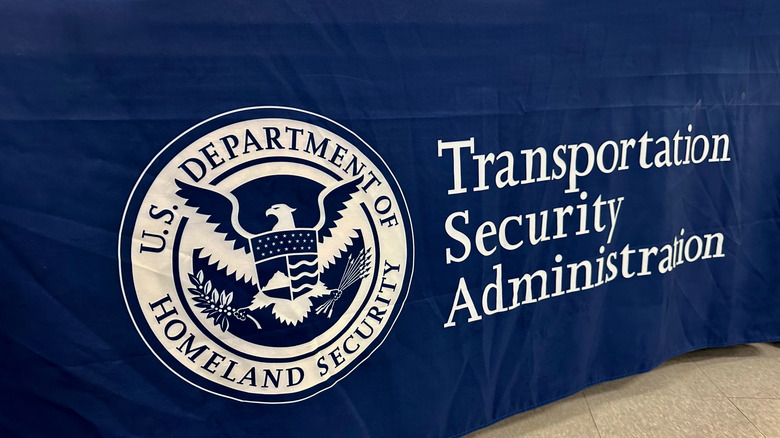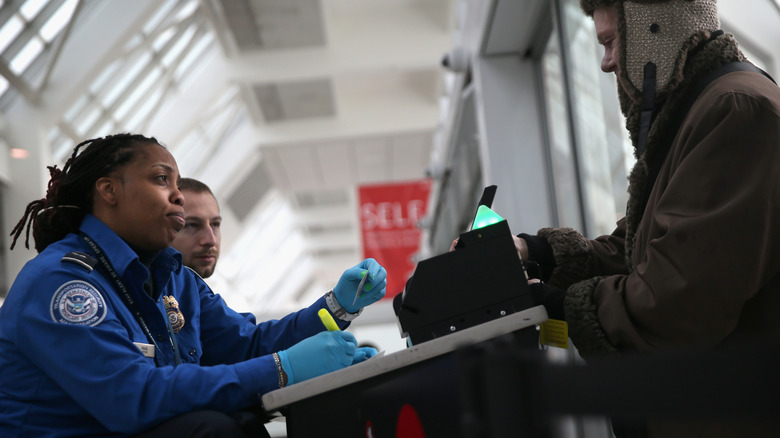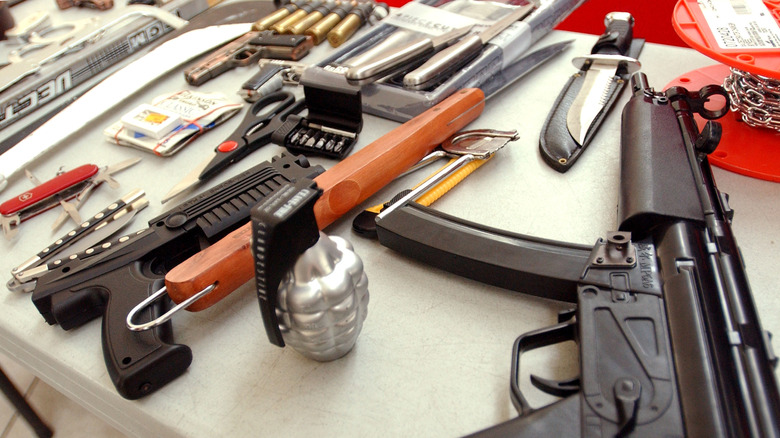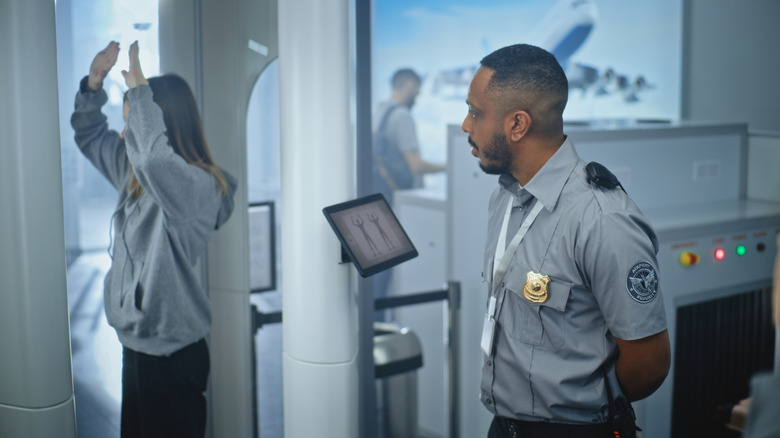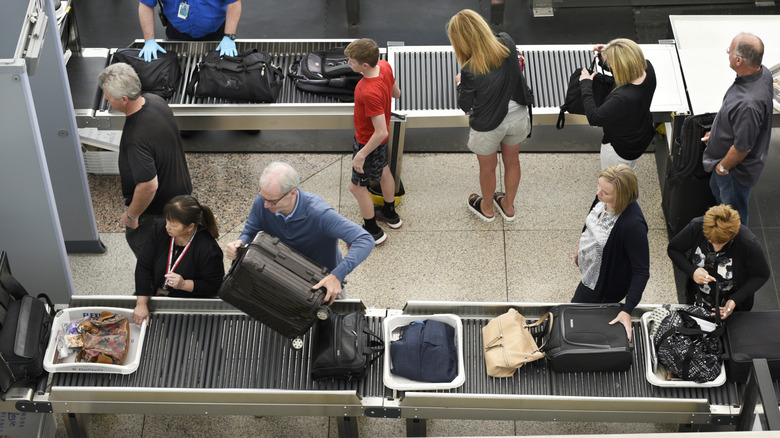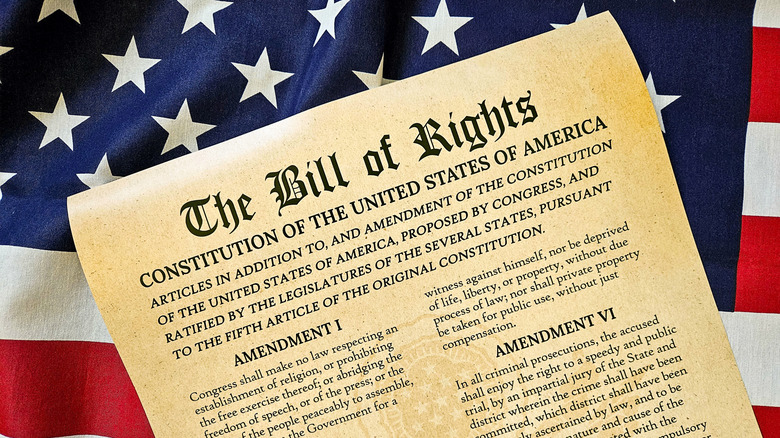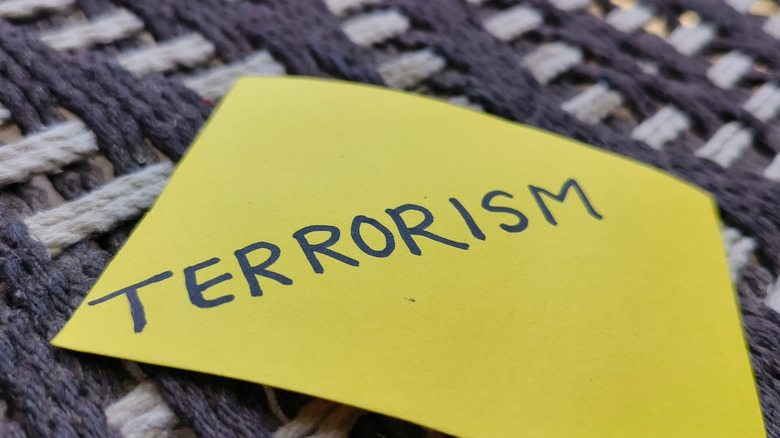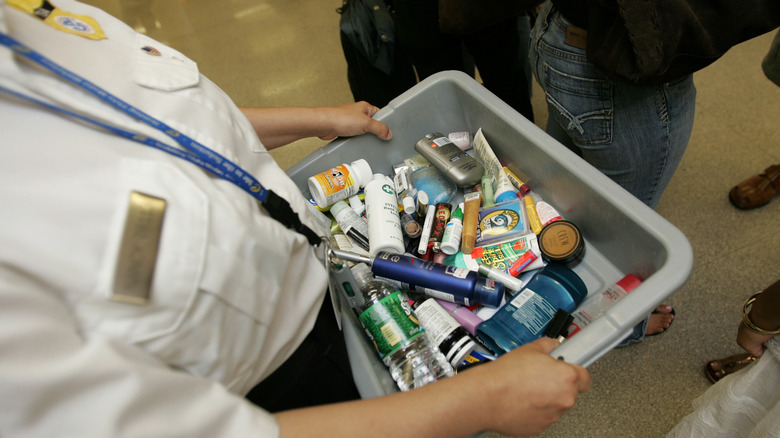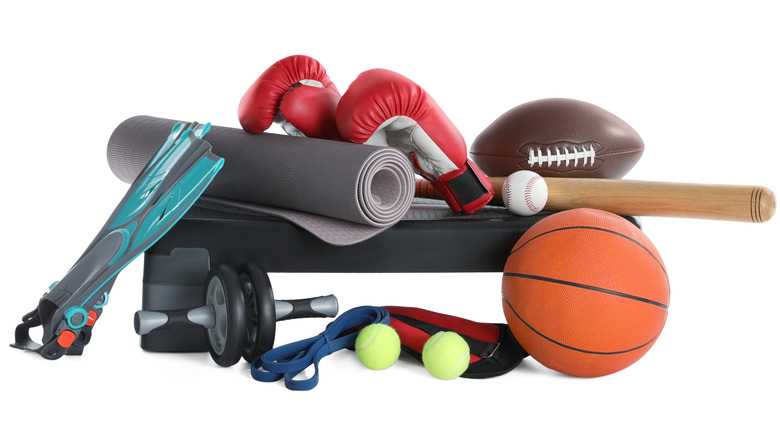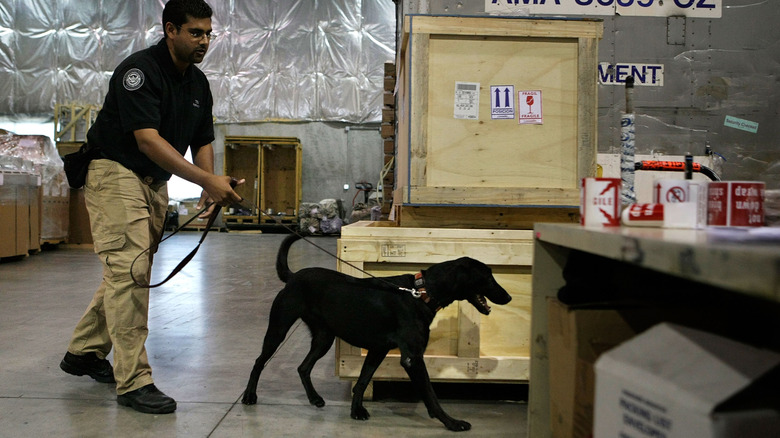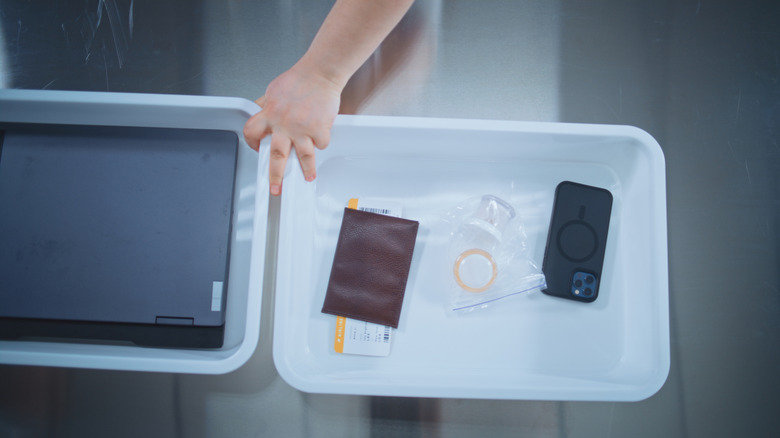11 Must-Know Dos And Don'ts For Getting Through Airport Security, According To TSA
Air travel is already stressful enough, thanks to long check-in lines, flight delays, and the ever-looming threat of cancellations. Throw angsty or grouchy children into the mix, and a trip can quickly become a nightmare before it has even begun. The last thing you need is the TSA security line throwing a wrench in your plans, whether it be by missing a flight thanks to a long line after being pulled aside for extra screening, losing valuable items to confiscation because an agent deemed them dangerous, or even criminal charges because you lost your cool and decided it was a good idea to yell at the staff.
Knowledge is power, and this cliche holds firm for your experience with the Transportation Security Administration. Things will go much smoother if passengers know what to expect. While it's true that TSA rules are rarely consistent at any two airports (the agency has the right to modify security procedures as they see fit), some things are still uniform. The TSA has provided numerous tips and plenty of information to ensure travelers can make their security experience as hassle-free as possible. Let's explore some do's and don'ts to get you through the line.
1. Do make sure you have the correct documents ready
When entering a TSA checkpoint, travelers must provide a boarding pass and a photo ID. This was a change brought in after 9/11 to stop non-travelers from going to the gate. Those without these documents are not allowed to pass through the TSA checkpoint. According to the TSA, "I forgot" is frequently used as an excuse, but it (unsurprisingly) isn't a valid one. Travelers without the necessary documentation must undergo additional verification. If the TSA cannot verify your identity, you will be denied passage.
There are multiple forms of acceptable ID for domestic travel. U.S. citizens can use their passports, passport cards, REAL ID-compliant driver's licenses, state IDs, and tribal IDs, all kinds of ID that most people carry in their wallets. For foreign travelers, the list is a bit different. Short-term visitors will need their passports, while permanent residents can use their green cards. Canadian citizens can use provincial driver's licenses. However, for international travel, only passports are permitted, and if you don't have one, you will not be allowed to fly, period.
When approaching the checkpoint, it's always a good idea to have the documents out and ready to go. A simple hack is to place boarding passes into passports (if using that form of ID), which will keep them together. This also makes traveling with children much easier since each passport-boarding pass pair can be handed to the agent without shuffling to figure out what document belongs to whom.
2. Don't bring weapons in your carry-on
All airports are federal facilities, meaning firearms, knives, ammunition, and other weapons are strictly prohibited. Any traveler caught with such items at a TSA checkpoint in carry-on luggage (knowingly or otherwise) is in for a world of pain. Penalties for carrying knives range from $450 to $2,750. Lucky violators may be let off with a warning, but the knife will be confiscated.
Firearms, however, are a much more serious issue. If the TSA catches a firearm in a carry-on, the agency will confiscate it. Violators face penalties of up to $17,000 plus a potential criminal referral, depending on whether the gun is loaded. If the weapon was loaded (ammo in the chamber or magazine) or if ammo was easily accessible — meaning it was found in the bag or on the traveler's person — penalties increase. If the offender violates state laws alongside federal regulations, those charges can also be added. Finally, the TSA will suspend violators from TSA PreCheck for five years.
A good rule of thumb is never to take bags used regularly for transporting firearms (such as range bags) to the airport as carry-ons. You never know what you might have left in there. Even a single bullet is enough to warrant fines and criminal charges. Travelers carrying weapons for legitimate purposes must declare at check-in: Firearms and ammo must be locked in a hard-sided case, and knives must either be wrapped up or sheathed.
3. Do empty your pockets and prepare your clothing
The rules never seem the same at TSA checkpoints. TSA Press Secretary Carter Langston confirmed this, telling USA Today, "One thing that is a pretty frequent moniker here, "when you've seen one airport, you've seen one airport." They're all so very different." Because of varying standards, it is best to prepare your body and clothing for security and remove all items that might trigger the scanner — even those that seem innocuous.
The TSA requires travelers to remove shoes, jackets, and belts (TSA PreCheck excepted). However, the belt rule is unevenly enforced, as some officers may allow you to keep it on. If you are caught with an object in your pocket but the officer does not think it is worth extra screening, they may let you go. There is no blanket policy on watches, and jewelry is sometimes permitted unless it is considered oversized.
The easiest way to avoid extra security is to follow two simple rules: Empty your pockets and listen to the agents. If they don't want you to remove certain items, they will tell you (you can also ask). While removing even non-metal objects like paper from pockets might seem like overkill, it's for the best. Triggering the scanner is guaranteed to eat up valuable time with extra security screenings. Some agents might be lenient and allow you to go back and put any offending items through the luggage scanner. However, others may do a pat-down, swab test, or in-depth luggage search, wherein they unpack your bag. This takes time and could result in a missed flight.
4. Don't interfere with the screening
The TSA's definition of interference encompasses any activity that obstructs the administration's efficiency or causes fear of harm to agents. Physical interference with an agent and attempting to evade security procedures are both offenses that will net travelers hefty fines, the severity of which will depend on whether an agent was injured. However, courts have determined that non-physical interference (even otherwise constitutionally protected speech) like insults, unintended threats, and belligerent behavior (such as slamming your fist on the conveyor belt) are considered assault if they meet the aforementioned definition of interference. Assault of a federal employee means the government will very likely hit back with some steep penalties.
The TSA punishes non-physical interference with civil penalties of up to $13,000 and up to $17,000 for physical interference. Assaulting a federal employee — physically or otherwise — will result in additional criminal charges, which carry fines of up to $250,000 and 10 years in prison. To top it all off, there are also potential state charges for disruptive behavior and obstruction. In theory, a person who gets booked on assault charges, even for something as simple as an insult or snide comment, can face decades in prison and inevitable bankruptcy from fines.
The best way to deal with rude agents is to keep interactions as short, courteous, and professional as possible. The faster you get through, the better, and there is plenty of time to fight the agency in court if it violates your rights or person.
5. Do know your rights
While TSA officers enjoy firm protections, passengers also have protections against criminal and discriminatory behavior by agents. For one, travelers are entitled to a fair, minimally intrusive, and non-discriminatory search. Pat-down searches are contentious due to legitimate concerns of groping by unscrupulous agents. You cannot refuse a pat-down search and expect to clear the checkpoint, but you can request an officer of the same sex perform the search in a separate room before a witness of your choice. While the officers may request removal or adjustment of clothing like religious head coverings, they cannot strip search you. Finally, you may ask the officer exactly where they plan to touch. They also may not ask you anything about your religion, political beliefs, or personal life if there is discriminatory intent. Those with medical conditions or disabilities may request accommodation but must inform officers first.
Travelers selected for extra screening have the right to record all interactions as long as they do not interfere with the search. This is important should they need to report misconduct or discrimination to supervisors or file complaints. If the agency does not rectify the wrong, this will be valuable evidence for a lawsuit. When officers' actions cross the line into criminal conduct, such as groping of passengers (especially women and children), passengers should consider civil lawsuits against the agency and criminal charges against the offending agents. Again, video evidence will go a long way to ensuring you get justice if your rights or person are violated.
6. Don't joke about committing terrorism
As mentioned earlier, anything that can be interpreted as a threat or obstacle to a TSA agent's job is a federal crime and can land a passenger a court date on assault charges. So, what if you're in line with a buddy, and you make a joke about how you might have a bomb or some other explosive device on you just to mess with the agents' heads? It isn't going to go well.
Regardless of whether you think it's funny, it's a terrible idea. The federal government understandably takes such comments very seriously, as they can be considered crimes of intimidation and of providing false information. If the agents have any reason to suspect you aren't joking, it may result in a total airport evacuation, SWAT teams, bomb squads, and all sorts of delays for fellow passengers who did nothing to deserve such a thing.
In keeping with the seriousness of the act, violators face both civil and criminal penalties. Fines come first, ranging into the thousands of dollars. Once federal law enforcement gets involved, 18 U.S.C. 35 kicks in. This is the "bomb hoax" law, which makes it a felony to knowingly convey any false information regarding terror plots and the placement of explosives on aircraft. Crucially, it does not differentiate between actual attempts to mislead government officials and joking with your friend. The statute prescribes an additional $5,000 fine and up to five years in prison, in addition to any other charges for intimidation or obstruction. For these reasons and more, it is the number one thing TSA officers advise travelers not to do.
7. Do know the rules on liquids
When it comes to liquids, the TSA strictly enforces the 3-1-1 rule. Under this regulation, passengers are allowed to bring liquids, gels, creams, pastes, and aerosols as long as they are in containers of 3.4 ounces or less. This applies to everything that is spreadable or spillable, including things like certain types of makeup, peanut butter, jams, water, and even salsa. The rule dates back to 2006 when British and American authorities busted a plot to blow up commercial airliners using liquid explosives made from everyday household items.
Agents often remind passengers to throw away liquids before entering the checkpoint. If agents find liquids during a scan or search, they will usually discard them. However, flammable liquids can lead to fines of up to $2,500. For those traveling with children, do not attempt to argue with the officers about your kids' drinks. The agency makes virtually no exceptions to this rule, so if your children have anything like juice boxes or milk, they will have to finish them or throw them away.
The major exceptions to the TSA's 3-1-1 liquid rule are breast milk/baby formula, diaper creams, wipes, and medications. Travelers should declare these to agents, who will likely swab them before allowing them through the checkpoint. The other major exception applies to duty-free liquids, which are permitted in excess of 3.4 ounces as long as they are in sealed, tamper-proof bags.
8. Don't bring beauty products with glycerin or other chemicals used in explosives
In keeping with the issue of liquids, creams, and gels, passengers should know the TSA will occasionally select people for swab tests, which are administered on items or bodies to detect residues of explosives. However, many common ingredients used for making explosives also have legitimate civilian uses and are found in legal everyday products that passengers might bring through a checkpoint. This creates the chance for a false positive that will result in extra security and a lot of lost time.
The most common chemical travelers are likely to have unwittingly on their persons is glycerin. The liquid is used to manufacture explosives but is also one of the main agents in hydrating skin creams and is even present in certain foods and drinks. If you get a false positive, it isn't a reason to panic — you're not likely to get arrested. However, there is a good chance the TSA will empty your belongings in your carry-on in a separate room and swab everything you have. This will take time and could result in a missed flight for travelers on a time crunch. The best bet is to check whatever makeup and creams you are wearing before you travel. It might seem like a hassle, but it's not worth getting flagged and missing your flight.
9. Do know what sports equipment will get confiscated
The TSA doesn't just check for firearms and knives. Officers are on the lookout for anything that can be used as a weapon, even items that are allowed or not explicitly prohibited. Agents have the final say as to whether an item can be used as a weapon, so if you're an athlete, don't make the common first-timer mistake of packing expensive equipment in your carry-on that might get confiscated.
The basic rules for athletic equipment are logical — anything that can be used to bludgeon someone is not allowed in carry-on luggage. This includes things like baseball bats, golf clubs, and lacrosse sticks. However, it could also encompass things like massagers, which may be confiscated if the officer decides they can be used maliciously. The same thing applies to equipment like track spikes or cleats. Travelers on forums like Reddit have reported taking them through no problem, while others have claimed agents ordered them to remove the spikes from the shoes and throw them away. It really depends on who is working that day.
Athletic equipment is generally expensive, so travelers should not take any chances with these rules, as hit-and-miss as they seem. If you're unsure whether that essential piece of equipment for your sport will be confiscated, pack it in your checked bag. Otherwise, you may be faced with the choice of making your flight and leaving the equipment behind or going back to the check-in line, re-doing the security line, and possibly missing your flight.
10. Don't touch the K-9 units
Much like most law enforcement agencies, TSA employs K-9 units to help agents sniff out bombs, drugs, and certain explosive chemicals in passenger bags. Most of the breeds count among America's family favorites, ranging from the eager-to-please Golden and Labrador Retrievers to the much more guarded and independent German Shepherd, Belgian Malinois, and Short-Haired Pointer. You'll see furry friends in almost all American airports.
Given that these breeds are so beloved, there is the temptation to pet them, especially for children who can't resist a walking ball of fluff. However, the TSA says that under no circumstances are these dogs to be approached, let alone touched. These are working dogs doing a job; they are not there to play. A sudden distraction can result in a misunderstanding over a command that can place the dog, the handler, and whoever distracted the dog in danger. Despite the training that the dogs go through to ignore distractions, no training is ever completely bulletproof. In the worst-case scenario, it might end in a mauling.
If the dog approaches you unprompted, immediately notify the handler so it can correct the dog. If you absolutely must pet a dog, you have an option. Some American airports have started offering therapy dogs. Unlike the TSA K9s, these dogs exist to be petted and to provide solace to passengers — especially children — with fears or apprehensions about flying. Some airports offer cats, too.
11. Do charge your electronics
This one is less of a rule and more of a hack to help your electronics zip through the TSA scanner, but every little helps. TSA rules explicitly require passengers to remove all electronics bigger than a cell phone from carry-ons so they can be passed through the X-ray scanner separately. However, there is also the lesser-known rule — though some might call it more of a strong recommendation — that requires passengers to charge their electronics before taking them through the checkpoint.
There is an unexpected reason behind the TSA's suggestion on charging electronics, even if it is not always enforced. If your device is flagged for additional security, agents may ask you to prove it isn't a dummy device concealing an explosive. Often, this will include booting up the device.
Let's say your $2,000 gaming laptop is flagged. The officer asks you to turn it on, but you can't because the battery is dead. With no way to show that it is a computer rather than a bomb, the agent might confiscate the device, leaving you with a decent-sized hole in your wallet. And if it's your work computer that you need for a business trip, you're in serious trouble. You will be able to get it back eventually, but you'll have to go through lost and found, assuming it doesn't end up in a TSA-seized property auction first. All that because you didn't take the time to plug in your device the day before leaving on your trip.
